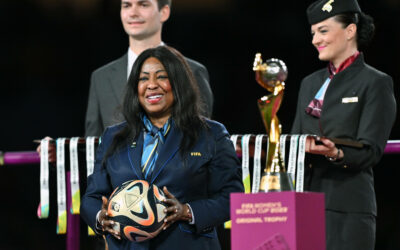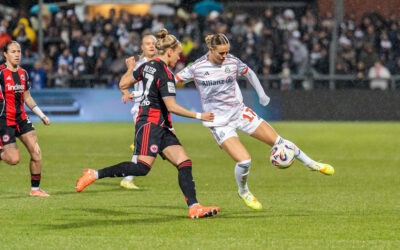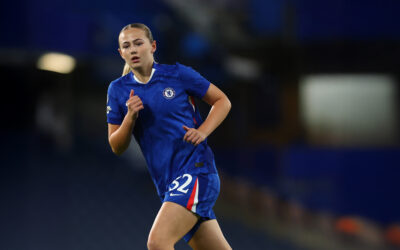
A significant uptick in global ticket sales ahead of UEFA Women’s EURO 2025 suggests women’s football is entering a new commercial phase, with fan interest increasingly spread across the tournament rather than concentrated solely on the final.
At a media event hosted in London on June 23, ticketing marketplace viagogo revealed sales for this summer’s tournament have increased by 112% compared to the same period ahead of EURO 2022. Tickets have already been purchased in 38 countries, while daily searches for EURO 2025 matches on the viagogo platform have more than quadrupled.
Unlike the 2022 edition, where the lion’s share of demand focused on the Wembley final, this year’s tournament shows a broader, more consistent pattern of interest. According to viagogo, just 15% of current purchases relate to the final.
Fans are now buying for a wider range of fixtures, including group-stage matches and early knockouts, in what viagogo described as a sign of market maturity.
Tournament demand no longer starts and ends with the final
Speaking at the event, viagogo’s international business lead Matt Drew argued this shift signals a broader evolution in fan engagement. “EURO 2022 sowed the seeds for fan interest,” he said, but the 2025 edition marks a new phase.
“We’re seeing growth in women’s sport with a true secondary market forming due to fan demand.”
The data backs that up. The viagogo platform has logged more than 1,000 daily searches for EURO 2025 tickets this month alone. As Drew put it, the company is functioning as a live barometer of fan appetite, revealing changing dynamics not just in volume but in geography and timing. Ticket buyers are more diverse in origin and more willing to travel, reflecting the rise of sports tourism within the women’s game.
As Drew noted in his earlier remarks, this mirrors trends already visible in men’s sport and major music events. “With Taylor Swift last year, we saw people fly from one side of the world to the other,” he said. “In sport, it’s a huge, huge thing… and increasingly a sign of maturity in the women’s football sector.”

A maturing fanbase and a changing market
The insight that fans are purchasing tickets earlier and for a wider set of matches is especially relevant to clubs, rights holders and broadcasters seeking to understand where and how women’s sport is growing. At domestic level, the average Women’s Super League (WSL) attendance remains on a steady upward trajectory, with clubs like Arsenaland Chelsea regularly leading in crowd numbers.
However, the event also acknowledged structural challenges. While marquee matches are drawing big crowds, smaller fixtures often rely on less accessible venues and inconsistent scheduling. In one panel discussion, the issue of stadium location was raised by an audience member, citing the example of Manchester United Women playing at Leigh Sports Village. Fran Kirby, the recently retired England forward, responded by highlighting the trade-offs clubs face.
“It’s different for different teams,” she said. “Even for Brighton, for example, we play at Crawley, which isn’t really anywhere near Brighton… you’re not going to suit every single person who’s going to want to come to a game of football.”
Tammy Parlour MBE, CEO of the Women’s Sport Trust, added that consistency of venue matters for building loyal audiences, suggesting that fragmented approaches can undermine long-term fan engagement.
Commercial opportunity, but not business as usual
viagogo’s partnership with Manchester City Women was cited throughout the event as a case study in how ticketing models might evolve. The club uses the platform not just for resale, but as a tool for distribution and fan targeting. Drew suggested that relying on the same strategies used in men’s football would be a mistake.
“There’s a trap that is often fallen into,” he said. “It is highly unlikely, if you are a WSL club, that all of your ticket buyers are going to be the same group that bought tickets for your men’s team.”
Instead, he argued for a different commercial logic; one that embraces resale as part of a broader marketing and audience-building strategy. While secondary marketplaces often face criticism for pricing volatility, Drew defended the model, noting that 30 percent of 2025 UK events on viagogo had average ticket prices under £50, and nearly 85 percent were under £100.

Visibility remains critical, but what comes next?
Much of the discussion ultimately returned to visibility. According to Parlour, visibility continues to be the most powerful driver of engagement. “Major tournaments like the Euros create powerful moments of attention – but it’s the sustained effort before and after these events that builds loyal audiences,” she said.
Kirby echoed the importance of connection, not just attendance. Reflecting on her own career, she said: “I made my international debut in Hartlepool and absolutely loved it, but it’s a world away from playing in front of 87,000 fans at Wembley.”
She spoke of the “amazing journey” of the sport, but also the need to keep pushing the level on the pitch and maintain relationships with fans, even as the crowds grow.
Drew concluded with a note of realism: “People talk about whether women’s football… is going to become a major sports ecosystem. It’s inevitable. The real question is how quickly it happens, and how many bumps in the road there are going to be.”
Author: Rachael Kennedy



